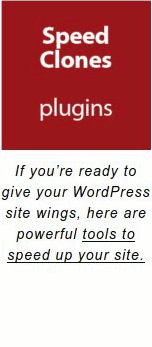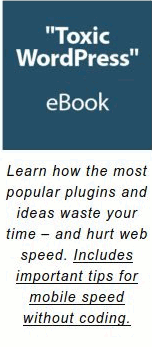
LiteSpeed Cache for WordPress is a site acceleration plugin. It features a server-level cache and a collection of optimization features.
LiteSpeed claims advantages over common Apache servers. We believe it.
But there are some LiteSpeed myths to debunk.
1It is up to six times faster than Apache. And 12 times faster than NGINX.
Does this make a difference in page load time? Not really. Real culprits slowing down websites are:
- javascript
- third-party APIs
- advertising
- email services
- heavy images
- etc
2It is three times faster than Apache in SSL.
Would we argue that a stereo performing above the range of human hearing is it really better?
3With its LiteMage cache, LiteSpeed makes Magento pages run up to 75 times faster.
Wow! That sounds really good. But, what does that mean for WordPress users? Uh? Nothing. Magento is an e-commerce platform built on open-source technology. It’s a content-management-system alternative for WordPress and WooCommerce. Big deal. It’s not even part of the WordPress world.
4It increases PHP performance by 50 percent.
Is PHP performance – or lack thereof – significant? Not from our tests. Immeasurable change.
REFERENCE: https://pagepipe.com/php-version-7-ate-my-wordpress-website/
So let’s talk about LiteSpeed benchmarks? What are they saying:
We tested HTTP/2 implementations from LiteSpeed Web Server, Nginx, and Apache, to see how they would compare when loading WordPress. LiteSpeed beat Nginx by up to 12X, and blew Apache out of the water by a whopping 84X! The best available WordPress cache plugins were used for each server: LSCache for LiteSpeed, FastCGI Cache for Nginx, and W3 Total Cache for Apache. – REFERENCE
They later mention those specs are on HTTP/2 servers. And they weren’t using cheap shared hosting. They used Vultr Cloud VM. That service costs extra money based on usage. Vultr’s cheapest cloud hosting plan is $5 per month.
What are they not comparing? They’re not comparing milliseconds of load time for a website. They’re talking about server processing requests per second. Not the same thing at all.
On common affordable everyday HTTP 1.1 servers, the results aren’t as shiny:
LiteSpeed Web Server performs 5X faster than Nginx and 28X faster than Apache when loading WordPress.
These specifications mimic what developers claimed about PHP version 7 when compared to PHP version 5. WordPress runs on PHP server-side language. Did that version update shave seconds or milliseconds off of WordPress page load times? No. It only increased server processing speed. The benefit wasn’t even measurable with standard speed tests. Hand-waving specsmanship. Pure hype.
Are these processing metrics a valid indicator of potential website speed improvement? Not for a minute.
Some speed considerations when using WordPress LiteSpeed Cache plugin:
1When plugins have multi-functions, they get heavy fast. LiteSpeed Cache plugin is no exception. Its file weighs 2 megabytes when decompressed. (Compared to 528k for Autoptimize plugin alternative.)
It’s better for speed to use “discrete” plugins (one function and few or no settings) rather than a multi-function plugin.
Autoptimize is a multi-function plugin, also. We use Autoptimize plugin sometimes – but not all the time. Why?
REFERENCE: https://pagepipe.com/plugins-autoptimize-eliminates-for-speed/
That’s right more plugins are better than less in the speed department. Only when using lightweight discreet plugins. One fat plugin like Yoast SEO – 150 to 250 milliseconds – negates all gains from discrete plugins.
Caching is a band-aid for inferior website design. Any page using origin-optimization strategy always loads faster. The complexity of many settings means the plugin isn’t dummy-proof.
Plug-and-play discrete plugins are more bulletproof. Caching often breaks site functions. As does minification (file concatenation). Because of fragility caused by complexity, we don’t always use a caching plugin. It’s herd mentality to always install a caching plugin. Especially popular ones like W3 Total Cache (1+ million active) and WP Super Cache (2+ million active). It’s better if you don’t use caching if you don’t get a significant gain. And we rarely do. Not with an optimized site built for speed.
2Using discrete plugins for individual features is faster. These plugins usually load in under 1 millisecond. LiteSpeed Cache adds 58 milliseconds of load time globally. That is on every page and post of your website. We call that site drag. We can install and activate over 53 discrete plugins in that same load time.
3The question-and-answer section of the LiteSpeed Cache website recommends third-party CDN workarounds. This is bad practice for speed. Again, it’s an after-the-fact repair band-aid. It doesn’t “fix” the sloppy site-origin problems. It masks the causes of real bloat. Apathy is the true cause of bloat.
4Using discrete plugins allows us to selectively activate or deactivate plugin functions on a page-by-page basis. This is always useful, especially on an e-commerce site. The store pages are dynamic. They often won’t work with caching plugins – or other plugins used for minification.
According to LiteSpeed developers, a single LiteSpeed server is capable of handling data equivalent to two Apache servers. We dislike LiteSpeed’s claim of “80 times faster.” Ridiculous vanity metric. Server execution time doesn’t translate into milliseconds of gain on a website. You can erroneously imply the same claim for PHP7 over PHP5. But change in server PHP versions doesn’t make a dent in poorly optimized images, ads, fonts, etc.
If LiteSpeed is free from your host, go for it. Use it. If you’re paying extra for it, think about what value you get and if it contributes to site profitability.
NOTE: Lightspeed was aggressively added to one of our sites by the hosts. That means they didn’t ask permission, they just added the LightSpeed plugin. That broke Easy Digital Downloads plugin checkout functions. Instant no sales. The solution? Because we knew they would just reinstall the plugin if we removed it, we used selective deactivation to turn off the LightSpeed Plugin on the checkout page. But that didn’t work. We had to have the host deactivate LiteSpeed completely. There are workarounds with LiteSpeed for ecommerce.
LiteSpeed and eCommerce problems
Litespeed cache causes the WooCommerce shopping cart to be updated incorrectly. LiteSpeed requires a configuration tweak. These are called exclusions.
Is WooCommerce supported?
For some WooCommerce themes, the cart may not be updated correctly. LiteSpeed blog has a tutorial on how to detect this problem and fix it if necessary.
https://blog.litespeedtech.com/2017/05/31/wpw-fixing-lscachewoocommerce-conflicts/
Then update your do-not-cache cookie list in LiteSpeed Cache plugin settings.
Find “Do Not Cache Cookies” in the LiteSpeed Cache > Cache > Excludes tab.
VIDEO
2:59 minutes
LiteSpeed Cache plugin – best settings for WordPress
EXCELLENT REFERENCE: https://wpjohnny.com/litespeed-cache-wordpress-plugin-unofficial-guide/
Do Not Cache URIs – used to exclude pages from cache. (List pages that have contact forms, logged-in pages, or any checkouts. Although WooCommerce checkout is already excluded by default.)

It’s reported:
WooCommerce doesn’t want something cached (like, for instance, the Cart, My Account, and Checkout), LiteSpeed Cache will automatically respect that, and will not cache those pages. There’s no extra configuration required.
REFERENCE: https://www.buyindemand.com/litespeed-cache-and-woocommerce/
But LiteSpeed doesn’t recognize Easy Digital Downloads plugin transaction pages. You’ll need to add those yourself.
PagePipe tells how to setup LiteSpeed Cache plugin.

Godspeed-
![]()
Steve Teare
performance engineer
May 2024
PagePipe Site Tuning Services for Speed
Instead of band-aid approaches, we drill down to the root cause of your slow site. This is origin optimization. Also known as site tuning. To do this, we analyze site components:
- Hosting
- Theme
- Plugins
- Scripts and third-party services.
- Images and media library.
- We minimize globally loading plugin effects.
Find out more details about Site Tuning – Get Speed!






